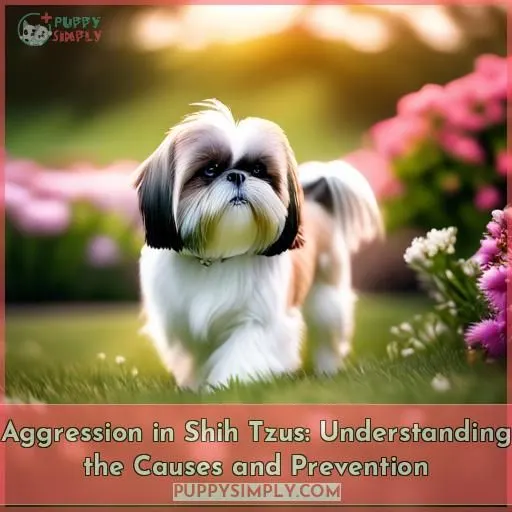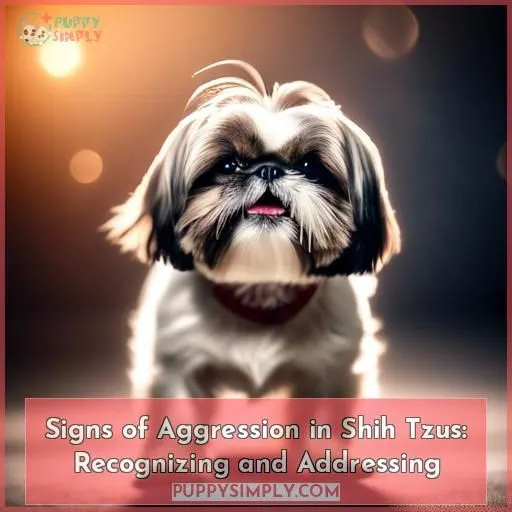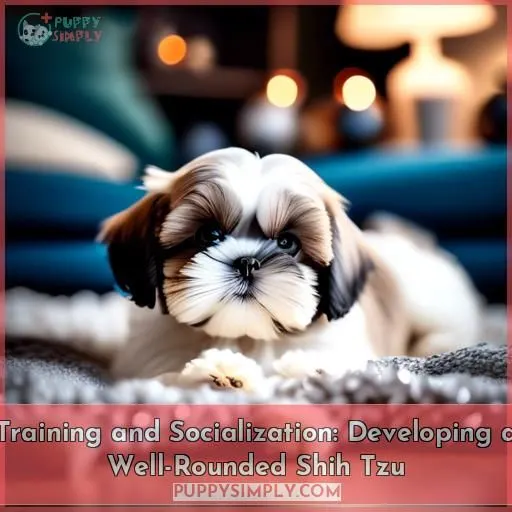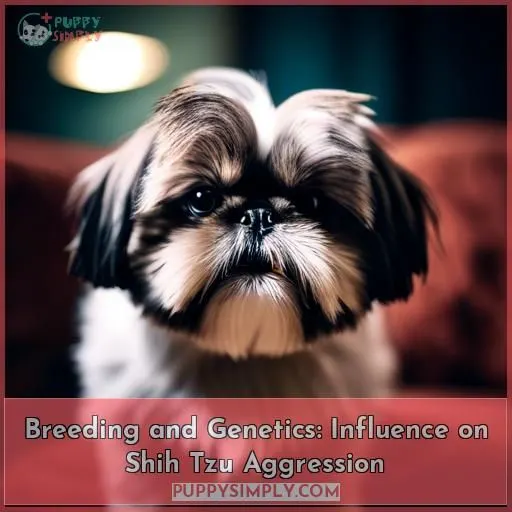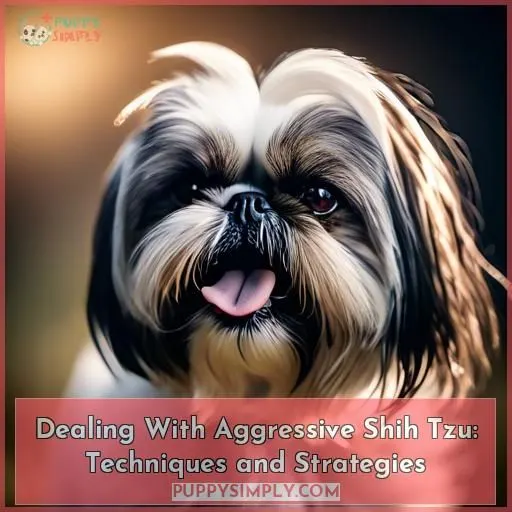This site is supported by our readers. We may earn a commission, at no cost to you, if you purchase through links.

Truth unlocked: Shih Tzus are not aggressive by nature.
Misconceptions about these affectionate companions stem from misunderstandings.
You’ll discover the actual causes behind any aggressive tendencies.
You’ll learn effective prevention methods and strategies for nurturing a well-behaved Shih Tzu.
Embrace their loving nature by unraveling the truth about Shih Tzu aggression.
Table Of Contents
- Key Takeaways
- Are Shih Tzus Aggressive the Truth?
- Aggression in Shih Tzus: Understanding the Causes and Prevention
- Signs of Aggression in Shih Tzus: Recognizing and Addressing
- Training and Socialization: Developing a Well-Rounded Shih Tzu
- Health and Wellness: Impact on Aggression in Shih Tzus
- Breeding and Genetics: Influence on Shih Tzu Aggression
- Dealing With Aggressive Shih Tzu: Techniques and Strategies
- Living With an Aggressive Shih Tzu: Coping and Management
- Frequently Asked Questions (FAQs)
- Conclusion
Key Takeaways
- Shih Tzus are not inherently aggressive, but they can exhibit aggressive behavior due to fear, dominance, or nervousness.
- Proper socialization and training from an early age are crucial for preventing aggression in Shih Tzus.
- Environmental factors, territorial instincts, resource guarding, pack mentality, and dominance issues can all contribute to aggressive behavior in Shih Tzus.
- To manage aggression in Shih Tzus, it’s essential to address the root causes, such as fear and anxiety, and implement behavior modification strategies.
Are Shih Tzus Aggressive the Truth?
Yes, Shih Tzus are generally not aggressive dogs. They were bred as companion dogs and do not have predatory instincts. However, individual dogs may exhibit aggressive behavior due to past experiences or lack of proper training and socialization.
Aggression in Shih Tzus: Understanding the Causes and Prevention
Shih Tzus, known for their affectionate nature, can exhibit aggression due to fear, dominance, or nervousness. To prevent this, socialize and train your Shih Tzu from puppyhood, discourage dominant behavior, and address aggression promptly.
Causes of Shih Tzu Aggression
Understanding the causes of Shih Tzu aggression**** is crucial for prevention and treatment.
Environmental factors, territorial instinct, resource guarding, pack mentality, and dominance issues can all contribute to aggressive behavior.
Temperament testing can help identify puppies with calm temperaments.
Proper socialization and training are essential for a Shih Tzu’s personality development.
Prevention and Treatment of Aggression
To prevent aggression in your Shih Tzu, start with socialization and training from an early age.
Neutering male Shih Tzus before puberty can help curb marking behavior.
Temperament testing can identify puppies with calm dispositions.
Shih Tzu training should focus on consistency and positive reinforcement.
Severity of Shih Tzu Aggression
Shih Tzus are generally known for their affectionate and playful nature, but like any breed, they can exhibit aggressive behavior. The severity of aggression in Shih Tzus can vary from mild to severe, with some dogs displaying aggressive tendencies more frequently than others.
Environmental factors play a significant role in the development of aggression in Shih Tzus. Lack of socialization, fear, anxiety, and negative life experiences can all contribute to aggressive behavior. It’s essential to address these factors and implement rehabilitation strategies to help your Shih Tzu overcome aggression.
When dealing with aggressive Shih Tzus, a risk assessment is crucial to determine the root cause of the aggression. This will help in developing an effective behavior modification plan. Consulting with a professional dog trainer or behaviorist can provide valuable insights and guidance in managing and reducing aggressive behavior.
Signs of Aggression in Shih Tzus: Recognizing and Addressing
As a responsible Shih Tzu owner, it’s crucial to recognize the signs of aggression in your furry companion.
- Dominance Displays: Your Shih Tzu may show dominance by standing over you, staring, or growling. This is often a warning sign that they feel threatened or insecure.
- Resource Guarding: If your Shih Tzu growls or snaps when you approach their food or toys, they may be guarding resources. This behavior can be a sign of anxiety and should be addressed.
- Fear Triggers: Shih Tzus, especially female ones, can become aggressive when scared. Common fear triggers include loud noises, sudden movements, or unfamiliar people.
Training and Socialization: Developing a Well-Rounded Shih Tzu
As a primary care giver, you play a crucial role in developing your Shih Tzu’s personality.
Temperament testing is a valuable tool in identifying puppies with high human focus, regardless of gender.
Early socialization, starting at 4 weeks old, is essential for a well-rounded Shih Tzu.
Positive reinforcement and training consistency are key to preventing undesirable behaviors.
Behavioral evaluation is also important to ensure your Shih Tzu matches your lifestyle.
It’s not merely about choosing a male or female; it’s about selecting a puppy that will thrive in your home.
Your Shih Tzu’s temperament isn’t set in stone; it’s a living, ever-evolving entity that requires your attention and care.
Health and Wellness: Impact on Aggression in Shih Tzus
Health and wellness play a crucial role in managing aggression in Shih Tzus. Understanding the impact of health on aggression can help you address the issue effectively.
- Genetics: Genetics can influence a Shih Tzu’s temperament and predisposition to aggression. Some breeds may be more prone to aggressive behavior due to their genetic makeup.
- Environmental factors: A Shih Tzu’s environment can significantly impact its behavior. A stressful or unfamiliar environment can trigger aggressive behavior. Ensuring your dog is comfortable and well-adjusted to its surroundings is essential.
- Health issues: Pain or discomfort from health conditions can contribute to aggression. Regular veterinary check-ups and addressing any underlying health issues can help reduce aggressive behavior.
To prevent aggression, focus on early socialization, positive reinforcement training, and environmental management. If aggression persists, consulting a canine behaviorist or professional dog trainer may be necessary.
Breeding and Genetics: Influence on Shih Tzu Aggression
Breeding and genetics play a significant role in the development of a Shih Tzu’s temperament and behavior. Understanding the genetic influence on temperament inheritance is crucial for responsible breeding practices. Shih Tzus are known for their affectionate and amiable temperaments, but these traits aren’t solely determined by breeding. Instead, genetics contribute to a dog’s innate temperament, while nurturing factors such as environment and training shape its personality.
When breeding Shih Tzus, it’s essential to consider the lineage characteristics, as these can impact the puppies’ behavior. Temperament testing can help identify puppies with high human focus, regardless of gender, and proper socialization and training are crucial for a Shih Tzu’s personality development. Breeding practices should prioritize producing puppies with mellow temperaments and good health, as Shih Tzus are susceptible to health issues such as hip dysplasia, allergies, and eye problems.
It is advisable to work with reputable breeders who prioritize the health and well-being of their dogs. They should conduct health screenings and genetic testing to ensure the healthiest possible puppies. Age is also a factor in breeding, as female Shih Tzus should be between 2 and 7 years old before breeding, as they’re most fertile and physically mature enough to handle pregnancy and delivery.
In conclusion, breeding and genetics have a significant influence on Shih Tzu aggression. Responsible breeders should focus on producing puppies with desired traits, such as mellow temperaments, and prioritize the health and well-being of their dogs. By understanding the complexities of genetic influence and temperament inheritance, breeders can help ensure the production of healthy, well-behaved Shih Tzu puppies.
Dealing With Aggressive Shih Tzu: Techniques and Strategies
After exploring how breeding and genetics play a role in shaping a Shih Tzu’s temperament, it’s crucial to tackle head-on how to manage if your furry friend shows signs of aggression. Remember, understanding the root causes, like fear and anxiety, can turn the tide in your favor.
- Identify environmental triggers: Keep an eye out for what sets off your Shih Tzu. It could be as simple as the hustle and bustle of dog parks or the stress of meeting new people.
- Lean on positive reinforcement: Reward calm behavior with treats and affection. This approach reinforces the good vibes without escalating the tension.
- Set clear potty training expectations: Consistency is key. Mixed signals can amp up anxiety, leading to unwanted aggression.
- Seek professional help: Sometimes, a pro’s insight is what you need to navigate through stormy waters. Don’t hesitate to reach out for guidance.
Dealing with aggression isn’t a walk in the park, but with patience and the right strategies, you’ll see the light at the end of the tunnel.
Living With an Aggressive Shih Tzu: Coping and Management
Living with an aggressive Shih Tzu can be a challenging experience, but with the right approach, you can help your furry friend become a well-behaved and loving companion. As a responsible owner, it’s crucial to ensure your Shih Tzu’s safety and well-being, which starts with managing your home environment. This may involve rearranging furniture, using barriers, or implementing a strict routine to prevent triggering aggressive behavior.
Behavioral modification is another essential aspect of managing an aggressive Shih Tzu. This may involve working with a professional trainer or behaviorist to develop a tailored training plan that addresses the root causes of your dog’s aggression. Consistency and patience are key, as it’s not merely about punishing bad behavior but also rewarding good behavior.
In some cases, veterinary support may be necessary to rule out any underlying health issues that could be contributing to your Shih Tzu’s aggression. This could include regular check-ups, blood tests, or even specialized treatments.
Frequently Asked Questions (FAQs)
Can diet influence Shih Tzu aggression?
You bet! Feeding your Shih Tzu a high-quality diet can positively impact their behavior. Poor nutrition might contribute to irritability and aggression, so a balanced diet rich in essential nutrients is key for a happy, well-adjusted pup.
Are certain toys better for aggressive Shih Tzus?
You bet! Interactive toys that engage their minds work wonders for aggressive Shih Tzus. Puzzle feeders, chase games, and durable chew toys help redirect their energy constructively. Don’t forget positive reinforcement training – consistency is key!
How does weather affect Shih Tzu behavior?
Like canine mood rings, Shih Tzus‘ temperaments mirror the weather—sunny days bring playful frolics; rain signals cozy cuddles with you.
Can Shih Tzus sense owner stress levels?
You bet! Shih Tzus are highly sensitive to their owners’ emotional states. If you’re feeling stressed, your furry pal will likely pick up on those vibes and may act clingier or more anxious than usual. Their empathy is one of their most endearing traits.
Do Shih Tzus require aggression-specific insurance?
Surprisingly, no specific insurance is needed for Shih Tzus – these affectionate companions are rarely aggressive if properly socialized from puppyhood. With their gentle nature, you can welcome a Shih Tzu into your loving home without worry.
Conclusion
Imagine a Shih Tzu, once aggressive, now a gentle companion by your side. With patience and proper training, you’ve demystified the truth about Shih Tzu aggression. Embrace their affectionate nature by addressing underlying causes, providing socialization, and maintaining their well-being. By unraveling the truth behind are shih tzus aggressive behaviors, you’ve unlocked a loving bond with your furry friend.

